mass incarceration
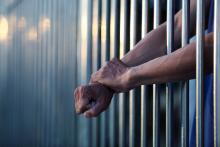
I HEAR A STIRRING, a rumbling. An awakening. Sometimes the sound is so faint, I worry it’s my imagination, my optimism getting the best of me. I pause, listen, and wait. Here it comes again. I want to rush to my window, fling it open, stick my head way out, and look around. Is it happening? For real this time? Is the sleeping giant finally waking up?
God knows we’ve slept too long.
Many of us—myself included—slept through a revolution. Actually, it was a counterrevolution that has blown back much of the progress that so many racial justice advocates risked their lives for. This counterrevolution occurred with barely a whimper of protest, even as a war was declared, one that purported to be aimed at “drugs.”
Really, the war took aim at people—overwhelmingly poor people and people of color—who were taken prisoner en masse and then relegated to a permanent, second-class status, stripped of basic civil and human rights such as the right to vote, the right to serve on juries, and the right to be free from legal discrimination in employment, housing, and access to education and public benefits. Branded “criminals” or “felons,” millions of people discovered that the very rights supposedly won in the civil rights movement no longer applied to them.
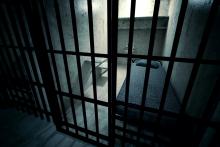
There is a moment in John Steinbeck’s classic, East of Eden, when readers witness the transformation of a stereotype into a human being.
Set in Salinas Valley, Calif., around the turn of the 20th century, Samuel Hamilton picks up Lee, his friend's Chinese servant. Lee wears a queue and speaks Pidgin English. Moments after meeting him, Hamilton learns that Lee was born in the U.S. and asks why he still can’t speak English.
Lee’s face and eyes soften and he speaks perfect English, explaining that he speaks Pidgin for the whites in town to understand him. Lee says, “You see what is, where most people see what they expect.”
Did you catch that? Lee plays the role of the foreigner in order to be seen and understood.
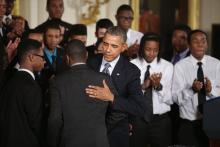
I have a vivid memory of my first visit to Sing Sing Correctional Facility in upstate New York. Some young inmates were reading my book, The Soul of Politics, as part of a seminary program in the infamous prison, and they invited me to come discuss it with them. The warden gave me and about 50 young men several hours together, and I will never forget the comment one of them made: “Jim, most of us here are from just five or six neighborhoods in New York City. It’s like a train that starts in my neighborhood, and you get on when you are 9 or 10 years old. The train ends up here at Sing Sing.” But then he said, “Some of us have been converted, and when we get out, we’re going to go back and stop that train.”
That’s exactly what President Obama’s launch of “My Brother’s Keeper” is calling us to do: to stop the train that is taking young men of color from broken economies, schools, families, and lives into despair, anger, disengagement, trouble, violence, crime, prison, and even death at an early age. This is an urgent and long-overdue moral call that must supersede all our political differences.
While the president’s agenda has always included goals intended to help all Americans, this launch was painfully, powerfully, and prophetically specific.
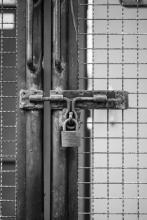
As I stated yesterday, I believe that America’s justice system is broken and in need of desperate repair. One of those areas is the practice of putting our citizens to death, something I believe that all Jesus People should resoundingly oppose.
When I was a conservative evangelical, I was a huge supporter of capital punishment for all of the standard reasons. I even had a quick response when folks correctly brought up the hypocrisy of being against abortion while simultaneously being pro-death penalty, a position I previously argued you can’t hold and still call yourself “pro-life.”
However, when I decided to follow Jesus instead of simply being a Christian who paid him hollow worship while conveniently ignoring the red words, I was forced to abandon my support of the death penalty (and abandon my support of violence in general) as part of Following Jesus 101.
While America’s broken justice system is a complex issue, perhaps the first area we can fix is by abolishing the death penalty in all 50 states. Here’s why I think Jesus People should be leading the charge on this issue:
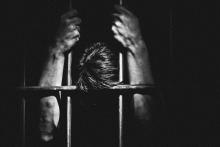
As we prepare for the coming of Christ, the third Sunday of advent is celebrated in joy. As followers of Christ, it is reasonable to be exuberant about the birth of our Savior. The amount of happiness that can seep from the soul in response to a virgin birth, a perfect baby boy, and an adorable scene of livestock and shepherds befriending God’s family is immeasurable. Christmas music, Christmas decorations, and yes, even Christmas presents add to the joy and never fail to put a smile on my face.
This past weekend, as I tried to reflect on what it means to be joyful in Christ, my heart was temporarily hardened as I attended a Reentry Arts & Information Fair for returning citizens. I helped host a table for Becoming Church and their Why We Can’t Wait initiative.
The Criminal Justice Degree Hub released an infographic on mass incarceration in the U.S. titled "Locked Up In America." According to the extensive graphic, the U.S. has 5 percent of the world's population and 25 percent of the world's prisoners.
Check out the graphic here.

I remember the first time I ever got straight A’s. It was also the last time.
I was in Mrs. Becker’s 4th grade class at John Story Jenks School in Philadelphia. I was always good at reading, I LOVED science projects, and art class was fun — but math? Ugh. Math was my nemesis. In 4thgrade the times tables felt as insurmountable as that dang rope everybody else could whiz up and down in gym class. I just couldn’t figure it out. In fact, to this day, I haven’t figured the rope.
So, my father became my times tables drill sergeant and resorted to straight memorization tactics, making me write each one 10 times. Then he sat across from me at the dining room table and drilled me on the times tables until I said them in my sleep. It was brutal … and oddly, one of the fondest memories of my elementary school years. Not only did I master multiplication, but I also learned something much more important. When my report card came back that quarter with straight A’s, I learned that I could learn!
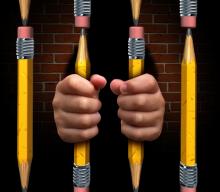
Over the last few years we have heard much about the school to prison pipeline. According to the ACLU, it is:
a disturbing national trend wherein children are funneled out of public schools and into the juvenile and criminal justice systems. Many of these children have learning disabilities or histories of poverty, abuse or neglect, and would benefit from additional educational and counseling services. Instead, they are isolated, punished and pushed out.
The Children’s Defense Fund argues that because of a lack of early childhood education and healthy beginnings, this epidemic begins before a child is old enough to enroll in school, defining the problem as the Cradle to Prison pipeline. Organizations such as the Advancement Project, the Legal Defense Fund, and many others too have defined the school-to-prison pipeline as just another level to the mass incarceration epidemic and one of the most disturbing injustices we face today.
We know that the pipeline is undergirded by Zero Tolerance policies, mass expulsions, unprecedented school arrests, inadequate school funding, and myriad other unjust policies that either criminalize our children or rob them of the resources they need to be successful. We also know that high-school dropout is certainly a station on the pipeline. In many urban centers the dropout rate hovers around 50 percent, and some data suggests 7,000 students drop out of school every day. What happens to kids that drop out of school? Where do kids who are expelled end up?

When I was invited by the Drug Policy Alliance to participate in a pastors’ conference at the American Baptist College in Nashville on drug decriminalization, I didn’t know quite what to expect. In a room filled with African-American pastors, I felt like a fly on the wall of someone else’s family reunion. I began to see our criminal justice system, and our country, through different eyes.
I’ve reported on the conference elsewhere, but there I learned that while 13 percent of drug users are African-American, they account for 38 percent of drug arrests and 59 percent of drug convictions. Feeling disproportionately targeted, the pastors want drug usage to be treated as a health issue rather than a crime.
As the conference unfolded, it dawned on me that I, as part of the majority culture, perceive law enforcement in ways strikingly different from the way many African-Americans see it. I have always experienced American authorities as my protector. If the police pull me over for speeding, it is nothing more than an annoyance, and the ticket won’t break me. Though I’m no fan of traffic cameras and drones, for the most part the police are there to watch out for me, and they do. It has always been that way for my family, as we can trace our roots of privilege back to Northern Europe in the early 1500s. Those in charge are the good guys who protect us and our stuff.
But for these African-American pastor-friends of mine, it’s a different story.
A radio documentary with Susan Burton, Michelle Alexander, and five residents of A New Way of Life Reentry Project.

The United States has the highest incarceration rate in the world — about 1.6 million people in 2010. Mass incarceration in our country is a problem, one that too often serves to line the pockets of for-profit prisons while tearing families apart and targeting people of color disproportionately.
Beyond Bars — a project to curb mass incarceration in the U.S. — produced the following video that puts faces to that problem. Watch the moving video below, and ask yourself the question: would putting them in prison serve the common good?
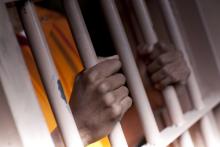
The United States has the highest incarceration rate in the world; one third of those incarcerated are serving long-term sentences for petty, non-violent crimes. One out of three African-American men will serve some sort of time under present law enforcement practices and the current criminal justice system. In Washington, D.C., that number jumps to an estimated three out of four. The United States imprisons a larger percentage of its black population than South Africa did at the height of apartheid.
More than 50 people gathered at Emmanuel Church of God in Christ in southeast Washington, D.C., on Sunday afternoon to hear the Rev. Louis Hutchinson remind them of these facts. Rev. Donnell Smith called the trend: “legalized discrimination.”
It’s been 50 years since several significant events of the civil rights movement of the 1960s occurred, yet our society is still plagued with systemic racism. It’s been almost 150 years since we abolished slavery in this country, yet many are still enslaved daily by the oppression of discrimination and poverty. While significant strides in equality and justice have taken place, new systems of injustices have been instated and threaten the integrity of our much-stated rights of “life, liberty, and the pursuit of happiness.”
I am most presently thinking of the system of the “New Jim Crow,” something author and advocate Michelle Alexander has awakened society to with the recent publication of her book with that title. The New Jim Crowrefers to the web of injustices related to mass incarceration and the stripping of basic rights of returning citizens reminiscent of the Jim Crow laws of our nation’s history. Today, returning citizens face “legalized discrimination” from employers and landlords, making it extremely difficult for them to get a job or a place to live. Additionally, in many states they are not allowed to sit on a jury or express their right to vote, meaning their voices are stifled.
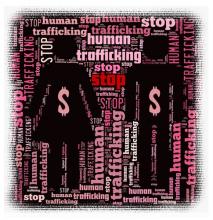
As our nation celebrates the legacy of Martin Luther, King Jr., I can’t help but wonder what injustices Dr. King would fight against today.
Would he rail against the “New Jim Crow” of mass incarceration, which disproportionately targets African-American men? Perhaps he would continue to speak out against the “most segregated hour of Christian America” — 11:00 a.m. on Sunday morning. After watching Les Miserables, I’d like to believe that Dr. King would focus on abolishing modern-day slavery.
Known as ‘Humankind’s Most Savage Cruelty,’ human trafficking is a global phenomenon driven by the profitability of sexual exploitation. From China to Washington, D.C., millions of men, women, and children are forced into sexual slavery each year.
Likewise, in Les Mis, we meet Fantine who unjustly loses her factory job and then, out of desperation, turns to prostitution to support her child. While she chooses to sell her body, the realities of poverty do not leave her with other options to earn a living. Not much of a choice, I’d say.
